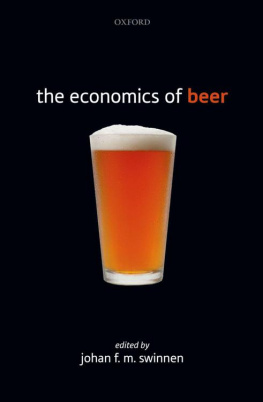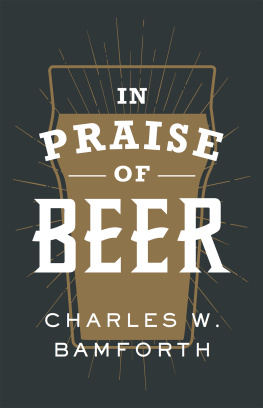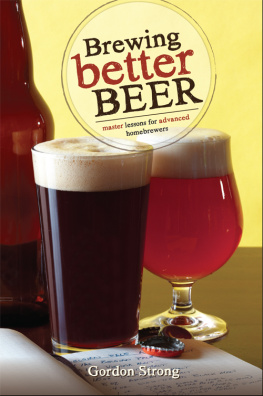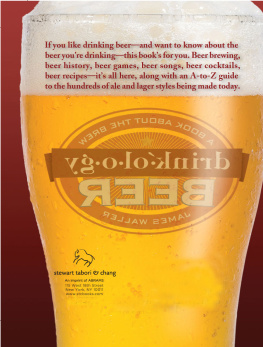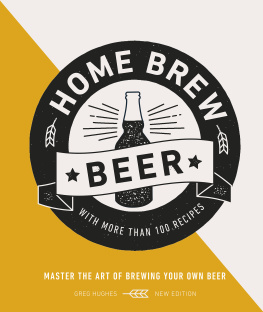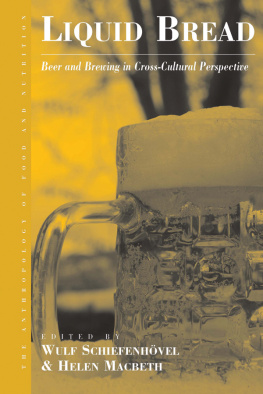The Economics of Beer
The Economics
of Beer
Edited by
Johan F. M. Swinnen


Great Clarendon Street, Oxford OX2 6DP
Oxford University Press is a department of the University of Oxford.
It furthers the Universitys objective of excellence in research, scholarship,
and education by publishing worldwide in
Oxford New York
Auckland Cape Town Dar es Salaam Hong Kong Karachi
Kuala Lumpur Madrid Melbourne Mexico City Nairobi
New Delhi Shanghai Taipei Toronto
With offices in
Argentina Austria Brazil Chile Czech Republic France Greece
Guatemala Hungary Italy Japan Poland Portugal Singapore
South Korea Switzerland Thailand Turkey Ukraine Vietnam
Oxford is a registered trade mark of Oxford University Press
in the UK and in certain other countries
Published in the United States
by Oxford University Press Inc., New York
Oxford University Press, 2011
The moral rights of the authors have been asserted
Database right Oxford University Press (maker)
First published 2011
All rights reserved. No part of this publication may be reproduced, stored in a retrieval system, or transmitted, in any form or by any means, without the prior permission in writing of Oxford University Press, or as expressly permitted by law, or under terms agreed with the appropriate reprographics rights organization. Enquiries concerning reproduction outside the scope of the above should be sent to the Rights Department, Oxford University Press, at the address above
You must not circulate this book in any other binding or cover
and you must impose the same condition on any acquirer
British Library Cataloguing in Publication Data
Data available
Library of Congress Cataloging in Publication Data
Library of Congress Control Number 2011934714
Typeset by SPI Publisher Services, Pondicherry, India
Printed in Great Britain
on acid-free paper by
Clays Ltd, St Ives plc
ISBN 9780199693801
1 3 5 7 9 10 8 6 4 2
This book is dedicated to my friends and colleagues from all over the world with whom, over the past decades, I have had the immeasurable pleasure of discussing the economics of everythinghow the world workswhile enjoying wonderful beers.
Preface
The inspiration for this book came from colleagues who study the economics of wine. The economics of wine has now become a serious sub-discipline within economics, with annual conferences, a professional association, academic papers and publications, and a Journal of Wine Economics. Living in Belgium, with its large diversity of beers, and working in the city (Leuven) which hosts the headquarters of the worlds largest brewery, the thought occurred naturally that, if there was such a wide interest in wine economics, there should be room for a modest contribution on the economics of beer.
The beer market and brewery industry are and were economically (and politically) important. Beer was the drink of choice in many ancient societies and throughout much of the Middle Ages in large parts of the world. Right now, it is globally by far the most important alcoholic drink, in volume and value terms. There has been a strong interaction between governments (politics) and markets (economics) in the beer industry. For centuries, taxes on beer or its raw materials have been a major source of tax revenue for governments. Public authorities have also regulated the beer industry for reasons related to quality, health, and competition.
The beer market is a dynamic market. It is characterized by strong growth in emerging economies but also a substantial decline of beer consumption in traditional markets, and by a shift to new products. The largest brewing companies have developed into global multinationals, but in recent years there has been a strong re-emergence of small and local breweries.
The chapters in this book demonstrate that beeronomics covers a vast set of issues. The contributions cover history and development, demand and supply, trade and investment, geography and scale economies, technology and innovation, health and nutrition, quantity and quality, industrial organization and competition, taxation and regulation, etc. This not only makes the beer market an interesting sector to study in itself, but it also yields important general insights on how an economy (and the world) works.
When I raised the idea among fellow economists of organizing the first conference on the economics of beer and brewing, I received enthusiastic responses. My Ph.D. students were immediately excited. Inspired by this, I decided to go ahead, with the help of many. In late May 2009, around sixty economists from all over the world gathered in Leuven for the first Beeronomics Conference. It was a memorable conferencefor more than one reason. The conference inspired enthusiasm for continued activities in this field. Since then workshops on Beeronomics have been organized in Davis, California, and Bolzano, Italy. The second Beeronomics Conference will be organized in Munich in 2011. More will follow. In fact, we have just launched The Beeronomics Society: the International Association for the Study of the Economics of Beer and Brewing.
The Leuven conference also provided the inputs and the raw material for this book. Several of the chapters in this book are based on presentations at the conference. These chapters are complemented by contributions from experienced researchers in this field, drawing upon their earlier work on the economics and history of beer, and new research inspired by the conference.
I need to thank many people for their contributions. First and foremost, the members of the local organization committee of the Beeronomics Conference (Liesbeth Colen, Tim Goesaert, Giulia Meloni, Damiaan Persyn, Piet Sercu, Thijs Vandemoortele, Kristine Van Herck, Bert Van Landeghem, Stijn Vanormelingen) were a source of inspiration, enthusiasm, and encouragement throughout this project. They did a wonderful job in planning and organizing the conference. Without them, there simply would have been no conference, and no book.
Also the members of the international scientific committee were enthusiastic supporters of the conference and the follow-up work. I thank, in particular, Julian Alston, Kym Anderson, Jill McCluskey, Tim Josling, and Scott Rozelle. Adriano Profeta and Klaus Salhofer have taken the lead in organizing a new beeronomics conference. I also need to thank colleagues at the Katholieke Universiteit Leuven for their support of the conference and the follow-up activities. In particular, vice-rector Filip Abraham, dean Luc Sels, vice-dean Patrick Van Cayseele, my colleagues global development experts and trappist lovers (Jan Wouters, Hans Bruyninckx, and Patrick Develtere), as well as my critical local VIbPs (Cis Van Peer, Bert Wouters, Wif Mostinckx) for their support throughout this less-than-traditional project and their presence and support at crucial times. The city of Leuven generously hosted the conference participants in its wonderful sixteenth-century city hall; Freddy Delvaux and his brewing students brewed a special beer for the participants; and my fellow bikers in the Tour du Provence generously joined in celebrating the book contract.
Oxford University Press responded enthusiastically to the proposal to publish this book and it has been a pleasure working with them. Anna Sabadesh provided much appreciated help in the editing process. The Research Council of the Katholieke Universiteit Leuven (Methusalem Project) and the Flemish Scientific Research Foundation (FWO) provided financial support for the research for several of the book chapters.
Next page
